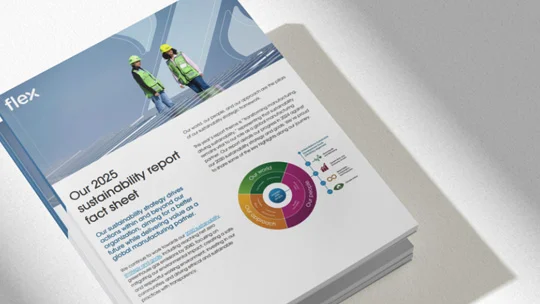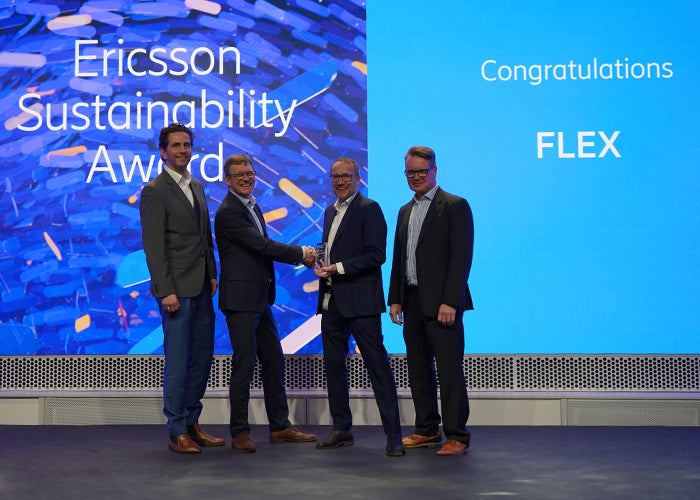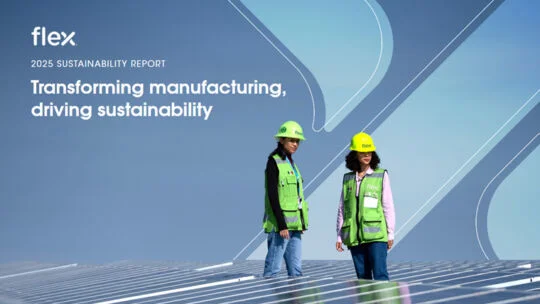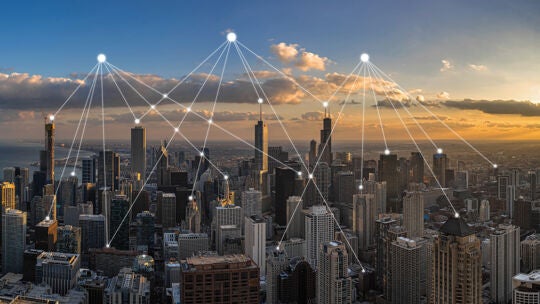
Flex’s renewable energy-powered manufacturing in Poland lowers carbon emissions for Ericsson and its 5G infrastructure equipment customers

Ericsson recently awarded Flex with its 2023 Supplier Sustainability Award — the second time since 2021. The award recognizes the extended supply chain benefits from sustainable manufacturing operations in the Flex facility in Tczew, Poland, that runs on 100 percent renewable energy.1 Both Ericsson and its European customers that purchase products manufactured by Flex in this location benefit from reduced Scope 3 emissions.
The Ericsson Supplier Sustainability Award recognizes suppliers that put sustainability at the heart of their business and meet our stringent emission reduction plan requirements. By investing in key sustainability initiatives, Flex is well aligned with our way of working and supports Ericsson in bringing our products to market while supporting our net zero target commitments.
— Patrik Lundblad, Chief Procurement Officer and Head of Ericsson Group Sourcing
Rich history: leading the 5G infrastructure with innovation and sustainable manufacturing
As one of Ericsson’s primary manufacturing facilities, the Flex site in Tczew manufactures 5G infrastructure equipment, including industry-leading lightweight and energy-efficient Massive MIMO antenna-integrated radios. Last year Ericsson celebrated the production of one million units in the Tczew facility with delivery of the one-millionth radio to Telia, the leading Nordic and Baltic digital communications company. Additionally, Flex provides sustainable manufacturing, supply chain, and circular economy services for Ericsson worldwide in China, Malaysia, and Hungary.
We are honored by this recognition from a global technology leader, sustainability champion, and customer for over two decades. Ericsson’s award celebrates the Tczew team and our global commitment to sustainable manufacturing operations, which support our customers in achieving their net zero targets. We appreciate Ericsson’s trust in us to support their ambitions to build out complex, energy-efficient, next-generation mobile networks with sustainability integrated from design and manufacturing to delivery and circular economy services.
— Rob Campbell, President of Communications, Enterprise, and Cloud, at Flex
Renewable energy: powerful scale for carbon reduction
Ericsson and Flex estimated that the use of renewable energy in the Tczew site enabled an 11k-ton CO2e reduction in Flex’s scope 2 carbon emissions dedicated to Ericsson for 2022 which translated to an estimated 14-ton reduction in embodied carbon emissions for the 1,401 baseband units shipped to Ericsson customer, BT Group.2 This example demonstrates how a simple, yet powerful shift can dramatically reduce emissions for complex products, market segments, and ecosystems serving as a model for other companies, regardless of industry.
Suppliers and their associated supply chains represent the majority of Ericsson’s upstream carbon footprint. Ericsson set a 2025 target to have 350 high emitting and strategic direct suppliers set their own emission reduction targets aligned with the 1.5 °C ambition, including a halving of emissions by 2030.3
Flex is meeting this goal by collaborating with value chain partners to reach emission reduction goals, including a commitment to a 50 percent reduction of absolute scope 1 and 2 greenhouse gas emissions by 2030 from a 2019 base year.4 Flex saw a 27 percent reduction in absolute scope 1 and 2 greenhouse gas emissions and almost two-thirds (64 percent) of specified5 Flex customers had science-based, emissions-reduction targets in 2022. These are milestones in the company’s journey to reach net zero greenhouse gas emissions by 2040.
1. As of CY2022.
2. Data showed that in 2021, Flex operations in Poland produced 1.1 million products per year for Ericsson, including 15,000 BB 6620 baseband units. Of these units, 1,401 were shipped by Ericsson to BT Group. Ericsson and Flex worked together to calculate the corresponding carbon emissions allocated to Ericsson in 2021, and Ericsson extrapolated that figure to 2022. They estimated that these emissions amounted to 11 tonnes — 10kg per product when spread across 1.1 million products. Ericsson could predict an 11-tonne reduction in carbon emissions across Scope 2 for 2022 for these 1,401 units, corresponding to an 11-tonne reduction in carbon emissions for BT Group across Scope 3.
3. “Sustainability and Corporate Responsibility report” (Ericsson, 2023) 7
4. The target boundary includes biogenic emissions and removals from bioenergy feedstocks.
5. Flex commits that 70 percent of our customers by emissions covering purchased goods and services, capital goods, and use of sold products will have science-based targets by 2025.


